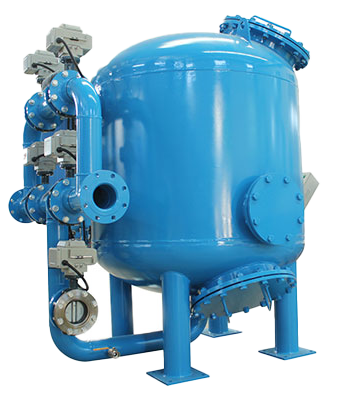Advantages & Applications of Manganese Sand Filters
On this page
The safety and cleanliness of water directly relate to people's health and quality of life. Manganese sand filters, as an efficient water treatment device, leverage their unique physical and chemical filtration mechanisms to effectively remove a variety of pollutants, including suspended particles, silt, rust, and organic matter, providing clear and healthy water. The core filtering medium, manganese sand, possesses superior redox capabilities, making the filter widely applicable and highly effective in treating drinking water, groundwater, and industrial wastewater.
The efficiency of manganese sand filters stems from their unique working principle, which encompasses both physical filtration and chemical reactions. Through these two mechanisms, manganese sand filters can effectively eliminate various impurities from water, thereby providing a clean and healthy water source.
When water flows through the manganese sand filter, the granular structure of manganese sand captures suspended solids, silt, and other large particle impurities. This process relies on the particle size and distribution characteristics of the manganese sand, often employing a combination of different grain sizes to enhance the effectiveness of the filtration layer and extend its lifespan. Coarser manganese sand effectively captures larger impurities, while finer particles help filter out smaller suspended matter. Physical filtration not only removes solid particles but also reduces water turbidity, enhancing clarity and transparency.
The redox capabilities of manganese sand enable it to engage in oxidation reactions with iron and manganese ions present in the water. This reaction transforms these ions into solid particles, which are then captured and retained by the manganese sand within the filter medium. This process effectively removes impurities like rust and improves the color and turbidity of water, enhancing its clarity and quality. Through these reactions, manganese sand filters significantly improve the safety of drinking water.

Manganese sand filters exhibit several notable advantages due to their unique working principles, making them popular in the water treatment industry. Firstly, their filtration process does not require additional chemical agents; they rely solely on physical and chemical mechanisms to achieve efficient water purification. This design not only lowers maintenance costs but also makes the operation more environmentally friendly, aligning with modern water treatment's sustainable development goals.
Manganese sand filters achieve effective filtration through physical and chemical processes, eliminating the need for frequent replacement and addition of chemical agents. This chemical-free characteristic not only reduces maintenance costs but also makes the filtration process more environmentally friendly and safe. The use of manganese sand filters effectively minimizes environmental impact, supporting sustainable development.
Manganese sand filters quickly remove impurities from water, ensuring high-quality effluent. Their flow rate and filtration efficiency allow them to maintain excellent performance under various water quality conditions, meeting the high standards required for industrial and municipal water treatment. The high filtration efficiency enables these devices to process large volumes of water in a short time, making them especially suitable for high-flow applications.
Manganese sand filters are compact and structurally simple, making them easy to install in water treatment systems of varying scales. Their flexible design is suitable for spaces with limited room, and both installation and maintenance processes are relatively straightforward, saving labor and material costs. For water treatment facilities requiring rapid deployment, manganese sand filters are an ideal choice.

Due to their exceptional filtration performance and diverse applicability, manganese sand filters are widely used in various fields, becoming indispensable equipment in the water treatment industry. Their ability to efficiently remove impurities from different water sources and quality conditions allows them to play a significant role.
Manganese sand filters effectively remove various impurities from drinking water and groundwater, including suspended solids, iron, manganese, chlorine, and organic matter, providing users with safe and clean drinking water. As water quality standards rise, the role of manganese sand filters in ensuring compliant water quality becomes increasingly important.
In industrial wastewater treatment, manganese sand filters are commonly used to remove solid suspended solids and dissolved pollutants, ensuring the quality and safety of reclaimed water. Their excellent filtration performance extends the lifespan of subsequent treatment equipment and reduces maintenance frequency and costs, making them suitable for various industrial processes.
Manganese sand filters are often employed as pretreatment devices for precision filters, widely used before ultrafiltration and reverse osmosis (RO) systems, ensuring that the incoming water meets quality standards and thereby protecting downstream equipment. This application not only enhances the overall system's efficiency but also improves the quality of the final product water, meeting increasingly stringent water quality requirements.
In agricultural irrigation, manganese sand filters can remove impurities from water, preventing damage to irrigation systems and ensuring the cleanliness of irrigation water, thereby enhancing crop growth quality. Filtered water promotes the health of soil and plants, fostering sustainable agricultural development.
Manganese sand filters, with their efficient filtration capabilities, environmental friendliness, and cost-effectiveness, have become a significant choice in the field of water treatment. Their flexible adjustment and control functions can adapt to varying water treatment needs and changes in water quality, ensuring that users receive clean and healthy water. Whether for household, industrial, or agricultural applications, manganese sand filters provide reliable solutions, contributing to the advancement of the water treatment industry. Through continuous improvement and innovation, the technology and applications of manganese sand filters will continue to expand, meeting future water treatment demands that require higher standards.

